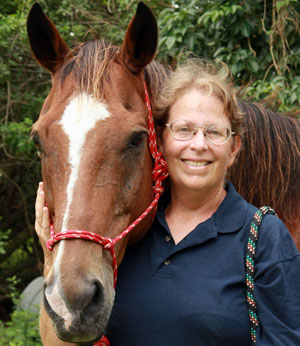TALES FROM THE TRAILS
Emily Jewel lives in southern Indiana and breeds draft horses. “We do a little bit of everything with our horses — shows, parades, horse expos,” she said.
It was at a horse expo, where she was giving a demo, that she first found out about Cytowave.
“Like many draft breeds, some of our horses were suffering from CPL, chronic progressive lymphedema, a nasty disease,” Emily said. “It starts with swelling in the lower legs, then progresses to tumor-like nodules and folded lumps of skin and lesions that ooze and weep. It’s a terrible disease that tends to target drafts. There’s no cure. If it gets bad enough, the horse has to be put down.”
According to a University of California Davis veterinary article, CPL is characterized by progressive swelling. “It is often first addressed as a marked and ‘therapy-resistant’ pastern dermatitis (scratches),” the article states. “The earliest lesions, however, are characterized by skin thickening, slight crusting and possible skin folds in the pastern area. Secondary infections develop very easily.”
The article continues: “More thick skin folds and firm nodules develop. The nodules may become quite large and often are described as ‘golf ball’ or even ‘baseball’ in size… This disease often progresses to include massive secondary infections.”
One of Emily’s Friesians had been diagnosed when he was only 6 or 7, and the disease continued to progress. “It was pretty devastating,” she recalled. “This horse is my baby. He had nodules and folds. His cannon bones had swollen to 13 inches in diameter.”
Then, at the horse expo, she ran into someone demonstrating a Cytowave machine, and although it didn’t have a specific setting to treat CPL, it did work well to reduce swelling. Emily wondered if it might help. She rented a machine and began using it daily.
After a month, she could see a noticeable difference. “The cannon bones had shrunk to 10 inches in diameter, and the folds and nodules were shrinking,” Emily said. “My vet was very impressed with the progress. The results are pretty dramatic. The horse feels a lot better and is more active.”
Emily said that the treatments are easy to do and not at all invasive. Ron Capito, Cytowave’s director of marketing, agreed. He lives in Palm City and frequently travels to Wellington to treat top show horses.
“When Cytowave first came out, it was hard for people to classify,” he said. “They assumed it was like other modalities, shock wave or electromagnetic, but it’s a new hybrid technology unlike any other.”
Cytowave is a combination of non-pulsing magnetic therapy, RF therapy and SQUID therapy signals. A magnetic coil delivers the tissue-derived therapy signals. A Super Quantum Interference Device (SQUID) detects the natural signals emitted from normal and damaged tissues.
The inventor recorded the difference between these signals and developed his proprietary “healing wave” signals to greatly increase the natural repair process of the body at a cellular level. It’s completely safe for both horses and the humans around them.
“A typical treatment lasts from 30 minutes to an hour,” Capito said. “We have boot applicators for legs, hooves and hocks, and back pads for the back and neck, which connect to the controller and allow the owner to select the program. Horses seem to enjoy it. They usually fall asleep. There’s no noise, vibration or excessive heat. There are no reported negative issues,”
Most users notice a difference in their horses after only a few treatments, he said.
“Currently, people have found great results treating leg, back and neck injuries. It’s really good with fractures, tendon and ligament problems, and anything where there’s a lot of swelling. It reduces edema and the associated pain. We suggest one treatment per day, every day,” Capito said. “Our users quickly discovered that Cytowave also appears to help in preventing injuries. By using it before and after workouts, inflammation is greatly reduced, and hence, there’s less chance of injury. When there’s a problem area, it becomes sore and fluid builds up, affecting performance. Cytowave prevents this, so the injury never happens.”
Meriwether Morris trains race horses and steeplechasers. Not too long ago, she bought a young Thoroughbred colt in a claiming race. When she got him home, she discovered that he had problems.
“He had suspensory injuries and bone chips in both front legs,” she recalled. “The vet scanned the legs and said it was the worst case he’d seen. The operations, four of them, would run $3,000 each, and there were no guarantees. He said it wasn’t worth it and I should give the horse to someone as a pasture pet.”
However, Meriwether learned about Cytowave from her jockey.
“He told me about the Cytowave machine, which he’d seen trainers use at Gulfstream Park in Florida with a filly who had terrible suspensory injuries. The machine cured her, and she was able to race and win again,” Meriwether said. “My vet shook his head and said I’d be wasting my money, but I got a bee in my bonnet and gave it a try. The legs looked fantastic after a course of treatment, but I put the colt back to work too soon and he reinjured himself. I gave him away, but I’ve used the Cytowave with another colt, and again, it really helped him. Then my daughter’s horse injured his neck, so we used it on him with terrific results. Cytowave is great. It really helps reduce swelling and is especially good with pinched nerves.”
Machines are available for rent or purchase, and reps are available to bring machines out to barns for free demonstration treatments.
For more information, visit www.cytowave.com or call (844) 298-9283.








